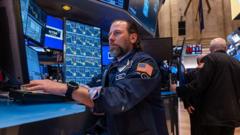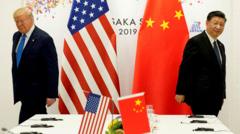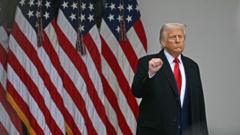The introduction of new tariffs by President Trump has triggered significant declines in the global stock market, as investors brace for potential economic repercussions. China's countermeasures emphasize the escalating tensions, raising concerns about a lengthy and damaging trade conflict.
Global Markets Plummet Amid Escalating Trade Tensions Following Trump Tariffs

Global Markets Plummet Amid Escalating Trade Tensions Following Trump Tariffs
Stock indexes worldwide drop sharply as China retaliates against recent tariffs imposed by the Trump administration, igniting fears of an intensified trade war.
Stock market volatility surged on Friday as global markets reacted to China's retaliatory tariffs against the recent levies imposed by President Trump. The U.S. stock indexes experienced steep declines, with all three major indices falling over 5%. Notably, the S&P 500 recorded a near 6% drop, marking the most challenging week for U.S. stocks since the onset of the pandemic in 2020.
In the UK, the FTSE 100 plummeted by nearly 5%, representing its largest drop in five years, while Asian markets followed suit, reporting significant downturns along with exchanges across Germany and France. Despite the turmoil, President Trump downplayed the shockwaves, asserting the resilience of the U.S. labor market and encouraging supporters to remain steadfast. "Hang tough," he urged via social media. "We can't lose."
The global stock markets have experienced substantial value loss—trillions erased—as Trump’s sweeping 10% import taxes on goods from multiple countries, including major trading partners like China and the EU, come into effect. Analysts regard this as the most considerable increase in U.S. taxes since 1968. Economic forecasts suggest these measures risk inducing a contraction in global trade, with potential recessionary impacts for numerous countries.
In retaliation, China on Friday announced a 34% import tax on U.S. goods and restricted critical mineral exports, condemning Trump’s actions as "bullying" and a breach of international trade protocols. Meanwhile, the EU's trade commissioner Maroš Šefčovič described a recent engagement with U.S. officials as a step towards negotiating a balanced approach, highlighting the need for a revamped trade relationship.
Trump's protectionist policies align with his campaign promises but far exceeded market expectations, triggering one of the worst trading days since March 2020 during the early pandemic period. Initially affecting companies heavily reliant on Asian supply chains, the sell-off quickly spread to other sectors, impacting consumer staples, healthcare, and utilities.
Experts underscore the uncertain outlook, with Mike Dickson from Horizon Investments raising concerns over the protracted effects of these tariffs. As a sign of evolving risk perceptions, JP Morgan increased its recession probability forecast for the global economy to 60%, illustrating the widespread anxiety surrounding potential fallout.
While some analysts acknowledged the wild market swings following an extraordinary run-up in U.S. stock values, others remain critical of the administration's aggressive trade-reset strategy. "Something has to happen," stated Tim Pagliara of CapWealth, emphasizing the need to address historical trade imbalances.
Federal Reserve Chairman Jerome Powell pointed to solid economic indicators but recognized the rising unpredictability associated with the tariffs. He indicated that growth is likely to slow while prices may escalate due to the unexpected breadth of the tariffs.
Despite the broader downturn, housing-related stocks found some support as investors speculated the economic turmoil could lead to lower mortgage rates. Move to capitalize on market fluctuations, shares in companies like Nike have started to recover marginally following positive negotiations with Vietnam.
Conversely, Apple shares dropped over 7% on Friday amid heightened concerns, leaving the tech giant's overall market value down 15% since midweek. The Dow Jones felt the pinch with a 5.5% decline, nearing a correction threshold, while the Nasdaq lost 5.8%, erasing roughly 20% of its value since December.
Internationally, the crisis reflects broader market fears as France’s CAC 40 and Germany’s Dax experienced significant losses. The Nikkei 225 in Japan also dropped more than 2.7%, with Prime Minister calling the situation a "national crisis."
As the futures market continues to react tumultuously to the evolving tariff landscape, industry stakeholders express concern for the agricultural sector among others. American farmers and businesses are preparing for increased operational costs and potential retaliatory measures.
In summary, the fallout from the Trump administration's tariff drive not only shakes U.S. markets but sends tremors globally, raising fears of a protracted trade war that could reshape economic landscapes for years to come.




















